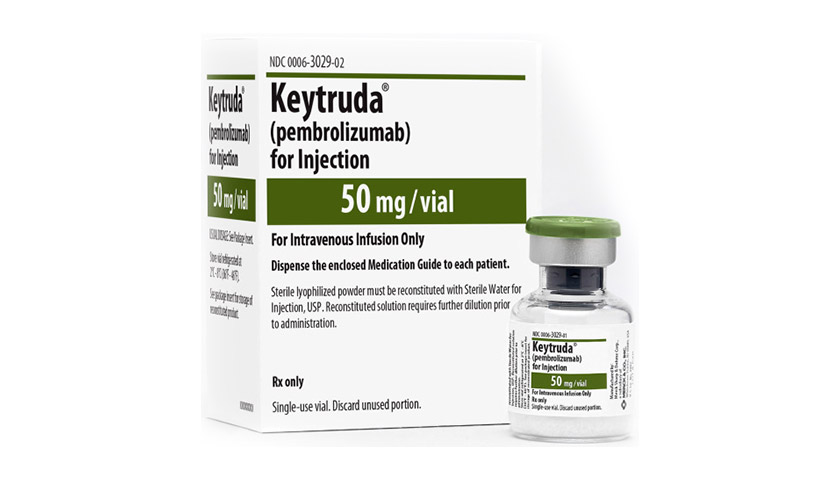Merck & Co squares up to Roche with Keytruda data in triple-negative breast cancer

Roche’s Tecentriq still has the market for front-line immunotherapy of triple-negative breast cancer (TNBC) to itself, but maybe not for long after Merck & Co reported good results with its rival drug Keytruda.
PD-1 inhibitor Keytruda (pembrolizumab) given alongside chemotherapy reduced the risk of disease progression or death by 35% compared to chemo alone in the phase 3 KEYNOTE-355 trial, according to data that will be presented at the virtual ASCO 2020 congress that starts later this month.
The study showed that Merck’s drug was effective in previously-untreated TNBC patients with high levels of the biomarker PD-L1, the same group for which PD-L1 inhibitor Tecentriq (atezolizumab) was approved last year.
Merck previewed the top-line results of KEYNOTE-355 earlier, but oncologists now have the chance to look at the actual data, and try to make comparisons between the drug and as a first-line treatment for PD-L1-positive TNBC last year.
The data from the abstract of the study at ASCO shows that Keytruda plus chemo improved progression-free survival (PFS) to 9.7 months, compared to 5.6 months for chemo alone, which was a statistically significant improvement.
There was a trend towards improved PFS in patients with lower levels of the PD-L1 biomarker as well 7.6 months for Keytruda and 5.6 months for the control group - but that wasn’t a significant difference.
TNBC is an aggressive and hard-to-treat subtype of breast cancer, representing around 15% of all breast cancer cases worldwide which is equivalent to around 300,000 cases every year. Patients with high PD-L1 expression account for about 40% of this total.
Roche has previously said it think Tecentriq could generate about $1 billion in sales from this indication alone.
Roche got approval for Tecentriq based on the results of the IMpassion130 trial in the same first-line, PD-L1-positive patient group, and showed a 20% improvement in PFS for Tecentriq plus Celgene’s Abraxane (nab-paclitaxel) versus Abraxane alone, at 7.2 months and 5.5 months, respectively.
It’s impossible to draw firm conclusions about the relative merits of the two drugs given the results were generated in different trials, but there’s little doubt that the data is strong enough for it to claim approval and challenge Tecentriq in first-line TNBC.
Merck – known as MSD outside North America – says it will press ahead with filing Keytruda for the new indication later this year, but it will have to chase down a near two-year lead for Roche’s drug.
It also has two other studies of Keytruda in TNBC on the go, including KEYNOTE-522 which is comparing Keytruda plus chemo to chemo on its own - given either before or after surgery to remove the tumour – to try to prevent recurrence of the disease.
Preliminary results from that trial reported last year showed adding Keytruda to chemo in the pre-surgery or neoadjuvant setting was more effective at clearing cancer cells from breast and lymph node tissue.
Also on the go is KEYNOTE-242, looking at neoadjuvant treatment with chemo followed by post-surgery (adjuvant) treatment with Keytruda, which is being sponsored by the National Cancer Institute.
Roche meanwhile is running the IMpassion131 trial of Tecentriq plus paclitaxel versus paclitaxel on its own as a neoadjuvant TNBC treatment, which is due to read out later this year.
Meanwhile, Merck may be encroaching on another company’s territory in TNBC, but it’s also facing incursions of its own in non-small cell lung cancer (NSCLC), the engine of Keytruda’s $12 billion sales in 2019.
Bristol-Myers Squibb published the abstract from its CheckMate-9LA trial of PD-1 inhibitor Opdivo (nivolumab), CTLA4 inhibitor Yervoy (ipilimumab) plus “limited” chemo in previously-untreated NSCLC patients, revealing a 31% reduction in the risk of death compared to chemotherapy alone after at least eight months of follow-up.
After a minimum follow-up of 12.7 months the overall survival (OS) benefit was sustained, at 15.6 months for Opdivo/Yervoy plus chemo and 10.9 months for chemo alone – a 34% improvement.
BMS also teased the results of CheckMate-9LA earlier, and is hoping the study – along with a companion trial called CheckMate-227 – will allow it to break Keytruda’s stranglehold on the first-line NSCLC market.
Keytruda is used mainly with four cycles of chemo in these patients, but BMS says its combination cuts the number of chemo cycles down to two.
That should stave off some of chemo’s side effects, but as the checkpoint inhibitors – and particularly Yervoy – have their own tolerability issues it remains to be seen whether oncologists will see value in adopting BMS’ regimen.
CheckMate-227 does away with chemo altogether, and new data from that study was also among the ASCO abstracts, showing that after three years, 33% of patients on Opdivo/Yervoy were still alive, compared to 22% of the chemo group.
BMS has filed for regulatory approvals based on both data sets, and is due to hear back from the FDA on CheckMate-9LA later this year.












